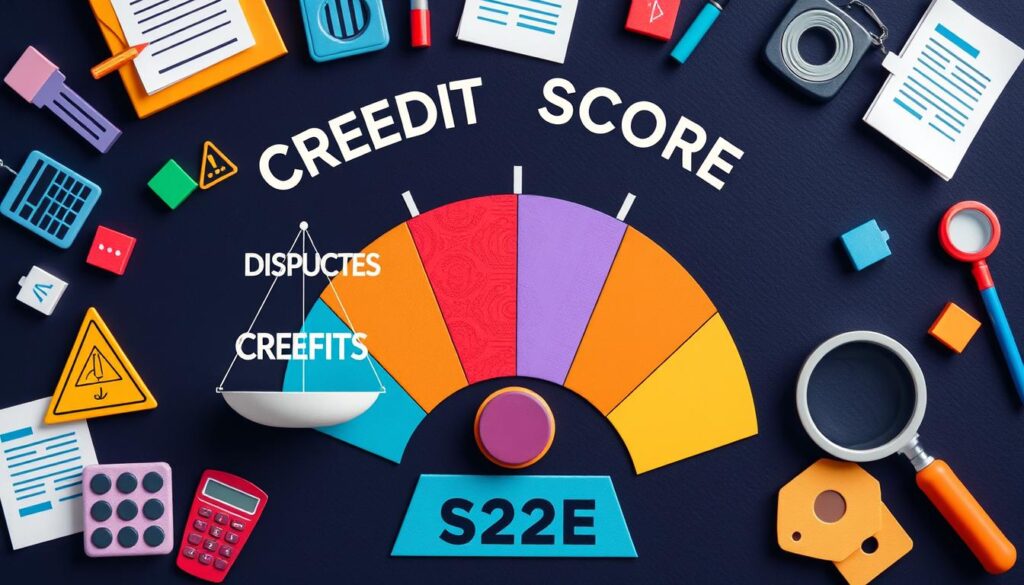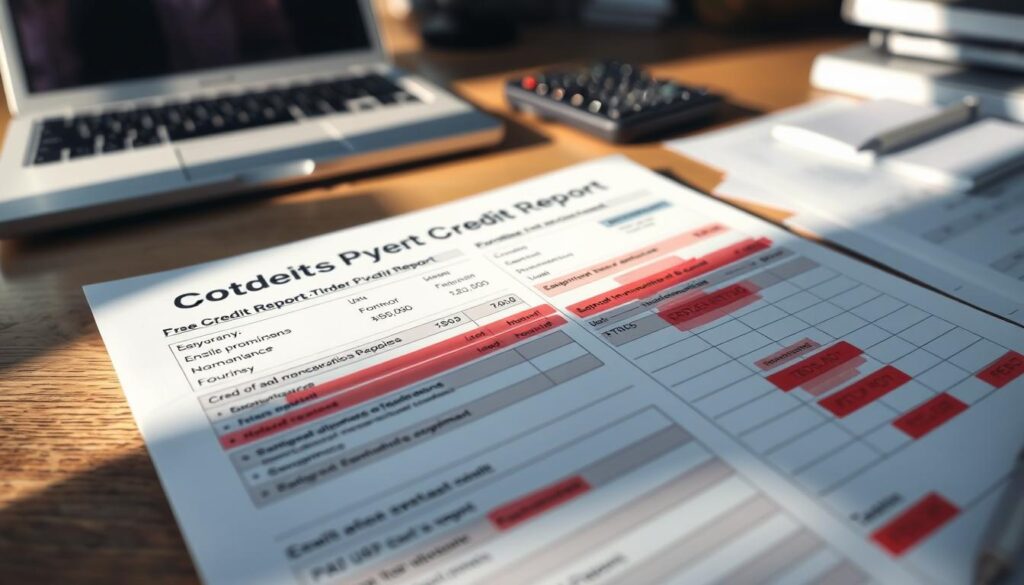A healthy credit score is vital for financial well-being. Credit report disputes can shape your creditworthiness. Understanding the risks and benefits of disputing is crucial.
Disputing inaccurate information may seem like an easy fix. However, it’s important to know how it affects your credit. Let’s explore the impact of credit disputes on your finances.
Key Takeaways
- Disputing credit report entries can potentially impact your credit score, both positively and negatively.
- Understanding the credit dispute process and the types of information you can dispute is crucial.
- Inappropriate or excessive credit disputes can lead to negative consequences, such as a drop in your credit score.
- Strategically disputing inaccurate information can help improve the accuracy of your credit report and boost your credit score.
- Seeking professional assistance from credit repair companies can be beneficial, but it’s essential to choose a reputable provider.
Understanding Credit Disputes
An accurate credit report is vital for your financial health. Credit disputes challenge wrong or incomplete info on your report. This includes errors in personal details, account data, or fraudulent accounts.
What is a Credit Dispute?
A credit dispute asks credit bureaus to fix errors on your report. It addresses issues that could harm your credit score. The main bureaus are Experian, Equifax, and TransUnion.
Why Dispute Credit Report Entries?
Disputing errors ensures your credit history is correct. Wrong info can lower your credit score. This makes it harder to get loans or credit cards.
It can also affect housing and job opportunities. By fixing these issues, you can improve your credit score and restore the accuracy of your credit history.
| Reason to Dispute | Example |
|---|---|
| Inaccurate personal details | Incorrect name, address, or date of birth |
| Incorrect account information | Incorrect account balances, payment history, or credit limits |
| Fraudulent accounts | Accounts opened without your knowledge or consent |
Understanding credit disputes helps you control your financial future. It ensures your credit history shows your true creditworthiness. Take action to address any issues on your report.
The Credit Dispute Process
Maintaining an accurate credit report is vital for your financial health. The credit dispute process helps you correct errors in your credit history. You’ll work with major credit bureaus like Experian, Equifax, and TransUnion to address these issues.
You can start a credit dispute online, by mail, or over the phone. Credit bureaus must investigate your claim by law. They’ll provide you with the results of their investigation.
The credit dispute process typically unfolds as follows:
- Identify the inaccurate or erroneous information on your credit report.
- Gather any supporting documentation or evidence that substantiates your claim.
- Submit your dispute to the appropriate credit bureau(s), either online, by mail, or by phone.
- The credit bureau(s) will then investigate the disputed item and provide you with the results.
- If the dispute is successful, the credit bureau(s) will update your credit report to reflect the accurate information.
The credit repair disputes process can be complex and time-consuming. However, it’s crucial for maintaining an accurate credit profile. Taking control of your financial future is essential.
By dealing with credit bureau disputes proactively, you ensure your credit report reflects your true creditworthiness. This can significantly impact your financial opportunities and overall standing.
“Disputing errors on your credit report is one of the most effective ways to improve your credit score and financial standing.”

Can Disputing Hurt Your Credit?
Disputing credit report errors can be beneficial. However, it’s important to know the potential risks. Excessive or inappropriate disputes might negatively impact your credit score.
This can happen if credit bureaus find the dispute frivolous. They may decide it lacks merit.
Potential Negative Effects
Credit disputes can have several impacts on your financial health. Let’s explore some key factors to consider.
- Damaged Credit Utilization Ratio – Frequent disputes can harm your credit utilization ratio. This ratio is a crucial part of your credit score.
- Declined Credit Applications – Lenders might see many disputes as a warning sign. This could lead to rejected applications or worse loan terms.
- Increased Costs – Repeated disputes may result in extra fees from credit bureaus. These charges can add up quickly.
Credit bureaus might ignore future disputes if they deem one frivolous. This could make fixing real errors harder later on.
Balance is key when dealing with credit disputes. Address inaccuracies, but avoid overdoing it. Knowing the possible negative effects of disputes is crucial.
This knowledge helps ensure your credit disputes don’t hurt your credit over time. Stay informed and dispute wisely.
Benefits of Disputing Credit Report Errors
Fixing errors on your credit report can boost your credit score. It ensures your credit history is accurate. This process reflects your true creditworthiness.
Improving Your Credit Score
Removing wrong negative items from your report can instantly raise your credit score. Errors like late payments or collections can hurt your score.
Getting rid of these mistakes can lead to a higher score. This can help you get better loan terms and lower interest rates.
Restoring Credit History Accuracy
Fixing credit report errors makes your credit history more accurate. Lenders can then make better decisions about your credit repair disputes.
An accurate report can open doors to more credit options. This helps you achieve your money goals easier.
“Disputing errors on your credit report is one of the most effective ways to improve your credit score and disputes.”
Checking your credit report for errors is worth your time. Fixing these mistakes can raise your score and make your report more accurate.
This active approach can positively impact your financial health for years to come.

| Benefit | Impact |
|---|---|
| Improved Credit Score | Increased chances of securing better loan terms, lower interest rates, and more favorable credit opportunities. |
| Restored Credit History Accuracy | Lenders can make more informed decisions about your creditworthiness, leading to greater access to credit products and services. |
Negative Effects of Inappropriate Disputes
Disputing legitimate errors on your credit report can be helpful. However, filing baseless disputes repeatedly can backfire. Credit bureaus might see this as system manipulation and ignore future disputes.
Inappropriate credit disputes can harm your credibility with bureaus. They may delay resolution of valid disputes. Your credit score could suffer, and your report might face increased scrutiny.
- Damage to your credibility with credit bureaus
- Delayed resolution of legitimate disputes
- Potential negative impact on your credit score
- Increased scrutiny of your credit report and activities
Credit bureaus must investigate disputes within 30 days. But if they deem your disputes frivolous, they may ignore future correction attempts. This can hinder credit repair efforts.
The impact of credit disputes can be significant. Unresolved issues and a damaged reputation with bureaus can impede credit score improvement. It may also hinder efforts to fix your credit history.
| Potential Negative Effects of Inappropriate Disputes | Impact on Credit |
|---|---|
| Damaged credibility with credit bureaus | Delays in resolving legitimate disputes |
| Negative impact on credit score | Increased scrutiny of credit report and activities |
| Difficulty in credit repair efforts | Restoration of credit history accuracy compromised |
To avoid negative effects of disputes, only challenge inaccurate or unverifiable items. Handle credit repair disputes carefully. Focus on maintaining good relations with credit bureaus.
Types of Information to Dispute
You can challenge various details on your credit report through credit report disputes. This includes errors in personal information and account details that may affect your credit score.
Inaccurate Personal Details
Mistakes in your name, address, or birth date can impact credit bureau disputes. These errors may lead to credit history mix-ups or identity theft. Disputing these details ensures your credit report accurately represents you.
Incorrect Account Information
Common debt disputes involve wrong account information on your credit report. This may include errors in balances, payment history, or account status. Such mistakes can harm your credit score.
Promptly identifying and disputing these inaccuracies is crucial. By addressing these issues, you can improve the accuracy of your credit report disputes. This helps create a more favorable credit profile.

Disputing Credit Report Entries Strategically
Strategic credit report disputes can boost your chances of success. Review your report carefully and gather supporting documents. Challenge only items you have legitimate reasons to contest.
Start by examining your credit report for inaccuracies. Collect evidence like receipts and statements to back up your claims. This methodical approach is key to the credit dispute process.
- Focus on disputing only the items that are genuinely inaccurate or unfair.
- Craft clear and concise dispute letters, providing a detailed explanation of the issue and the supporting evidence.
- Submit your disputes directly to the credit bureaus and any relevant creditors or collection agencies.
- Follow up on the progress of your disputes and be prepared to provide additional information if requested.
Navigate credit repair disputes thoughtfully to protect your credit report’s integrity. Address discrepancies that may affect your creditworthiness. Stay organized throughout the process for the best results.
| Dispute Type | Supporting Documentation | Potential Outcome |
|---|---|---|
| Inaccurate personal details | Identification documents, legal name change paperwork | Correction of incorrect personal information |
| Incorrect account information | Account statements, payment receipts, proof of identity theft | Removal of inaccurate account details or fraudulent accounts |
| Erroneous derogatory items | Evidence of payment, debt settlement agreements, statute of limitations documentation | Deletion of unwarranted negative entries |
Smart credit report disputes can boost your credit report’s accuracy. This approach may improve your credit score. It also helps protect your financial health and credit history.
Credit Repair Companies and Disputes
Credit repair companies help review reports, spot errors, and handle paperwork for credit disputes. They assist with credit bureau disputes and credit repair disputes. It’s vital to research these companies before using their services.
These firms offer expertise in navigating complex credit dispute processes. They can boost your chances of fixing credit report issues. Their knowledge and resources can be valuable assets.
Be careful when choosing a credit repair company. Some may make false promises or use shady practices. Check their track record and customer reviews first. Look out for hidden fees or unexpected costs.
Your needs determine whether to use a credit repair company. You can handle credit bureau disputes alone if you’re confident. For those wanting help, a good credit repair company can be useful.
| Benefits of Using a Credit Repair Company | Potential Drawbacks of Credit Repair Companies |
|---|---|
|
|
Debt Disputes and Credit Reports
Debt disputes can greatly affect your credit report. You can challenge incorrect debt information with credit bureaus. Resolving these disputes is key to improving your credit history’s accuracy.
Sometimes, a paid debt still shows as outstanding on your report. In this case, start a credit report dispute to fix the information. This can boost your creditworthiness and loan approval chances.
You can also challenge an unfair debt dispute with credit bureaus. Provide proof to show the debt’s inaccuracy. Successfully disputing the debt prevents harm to your credit bureau disputes and score.
Credit bureaus must legally investigate your disputes. They should make needed corrections to your report. Taking action on debt issues ensures your financial responsibility is accurately shown.
“Resolving debt-related disputes can be a powerful tool in maintaining the accuracy of your credit history and maximizing your creditworthiness.”
Dealing with Credit Bureau Disputes
Fixing errors on your credit report is vital. The process can be tough, but it’s worth it. Stay determined and thorough when dealing with credit bureaus.
Working with Credit Bureaus
Success in credit disputes requires clear communication and follow-through. Keep all documents organized and be ready to provide more info if needed. Don’t hesitate to escalate if the first try doesn’t work.
Credit bureaus must investigate your disputes within a set time. If they don’t, or if you’re unhappy, you can complain to the Consumer Financial Protection Bureau.
| Step | Action |
|---|---|
| 1. Identify the issue | Carefully review your credit report and pinpoint the inaccurate information you want to dispute. |
| 2. Gather documentation | Collect any supporting documents that can help prove the inaccuracy of the information on your credit report. |
| 3. Submit the dispute | File a dispute with the credit bureau directly, either online, by mail, or by phone. |
| 4. Follow up | Monitor the progress of your dispute and be prepared to provide additional information if requested. |
| 5. Escalate if needed | If the initial investigation does not resolve the issue, consider escalating the dispute to higher authorities. |
Follow these steps to boost your chances of success. Clear communication with credit bureaus is key. This approach helps resolve credit bureau disputes and ensures your credit dispute process is accurate.
Conclusion
Disputing incorrect info on your credit report can boost your credit health. Understanding the process helps you challenge errors effectively. This can positively impact your credit score and history.
Not all disputes are equal. Inappropriate challenges may harm your credit standing. Focus on fixing factual mistakes in your report. This approach can improve your credit accuracy and score.
Monitoring your credit report is crucial for financial health. Regular checks help you spot and fix errors quickly. This vigilance can lead to better credit over time.
By grasping can disputing hurt your credit and credit report disputes, you’ll navigate the process confidently. Understanding the impact of credit disputes and credit score and disputes link empowers your financial future.

